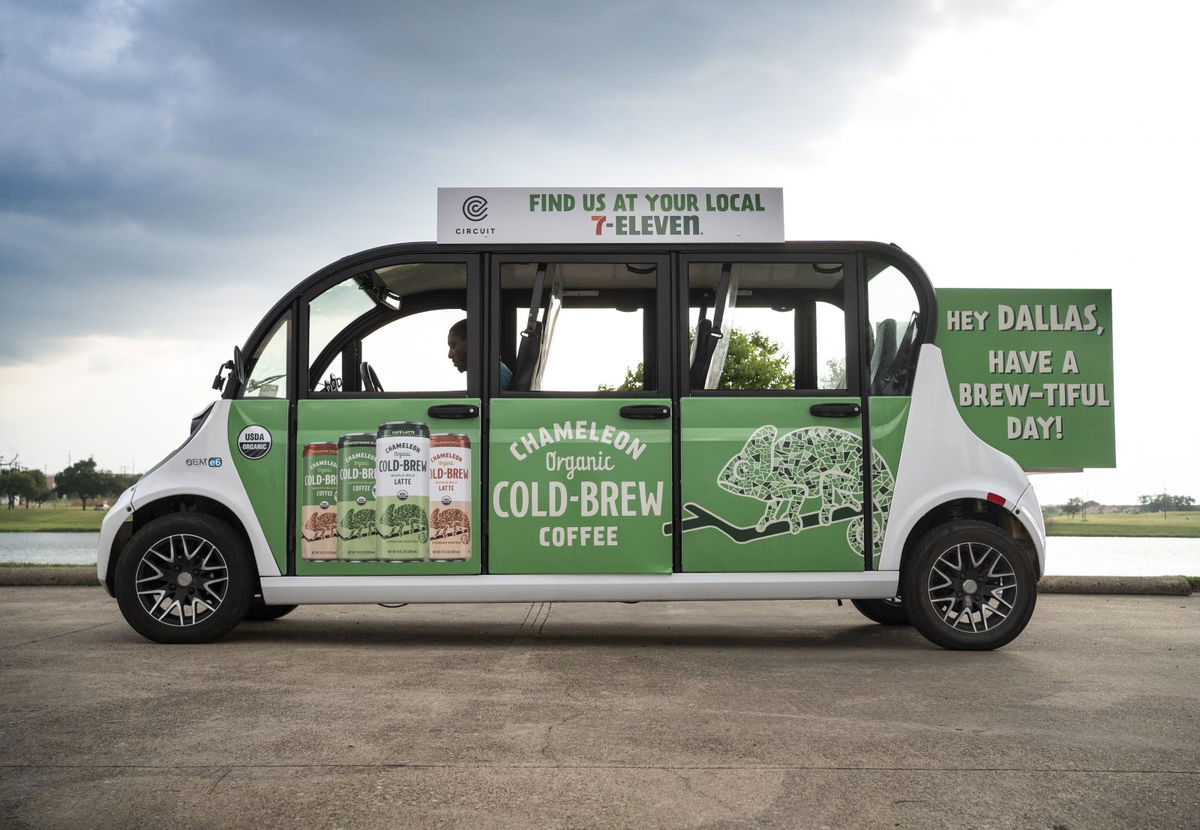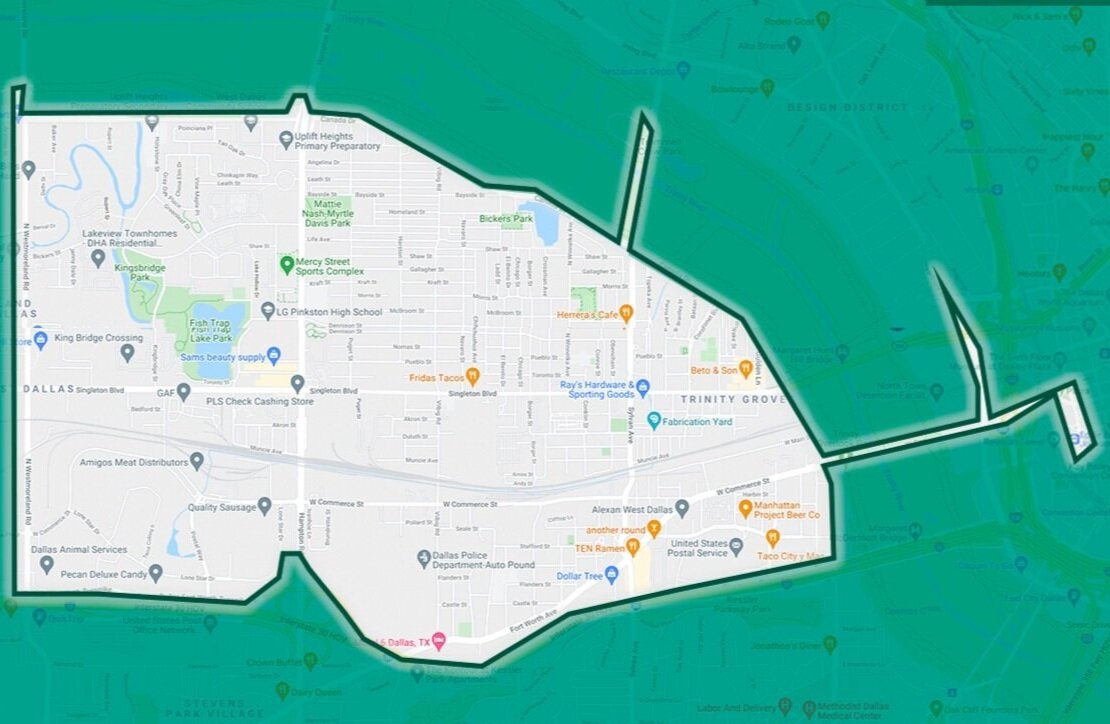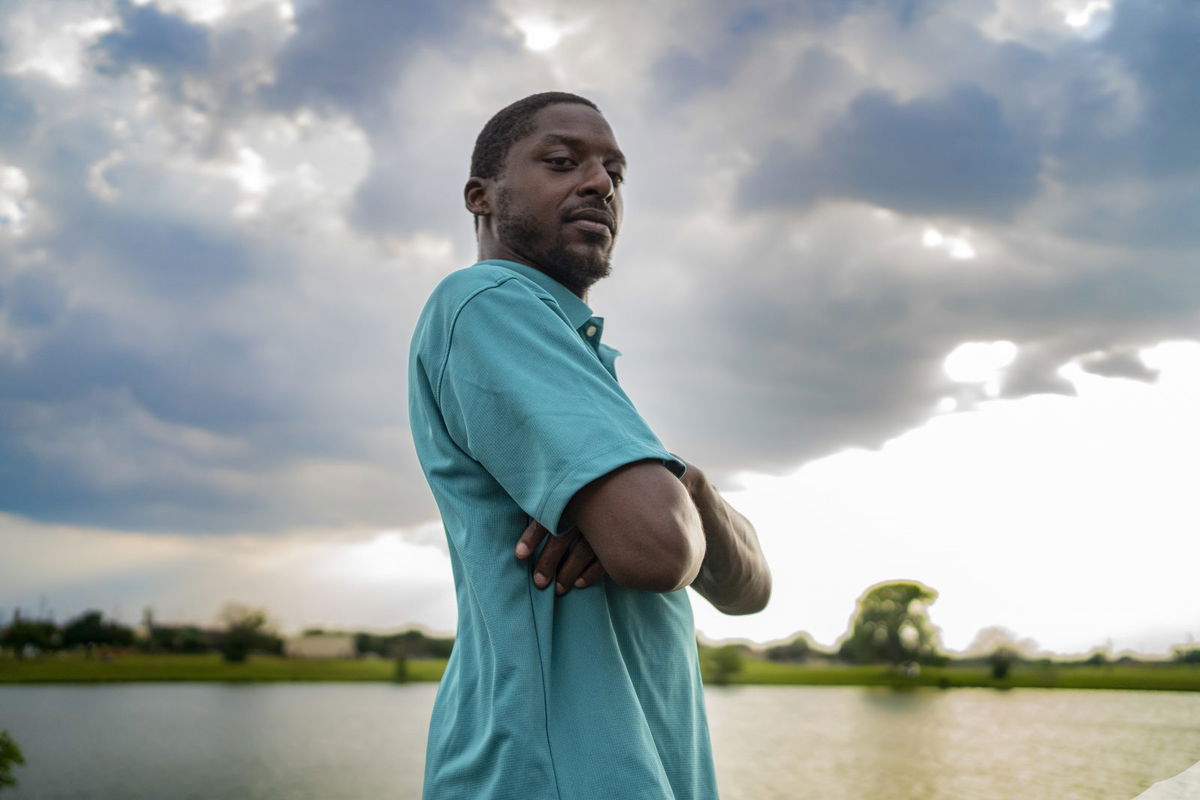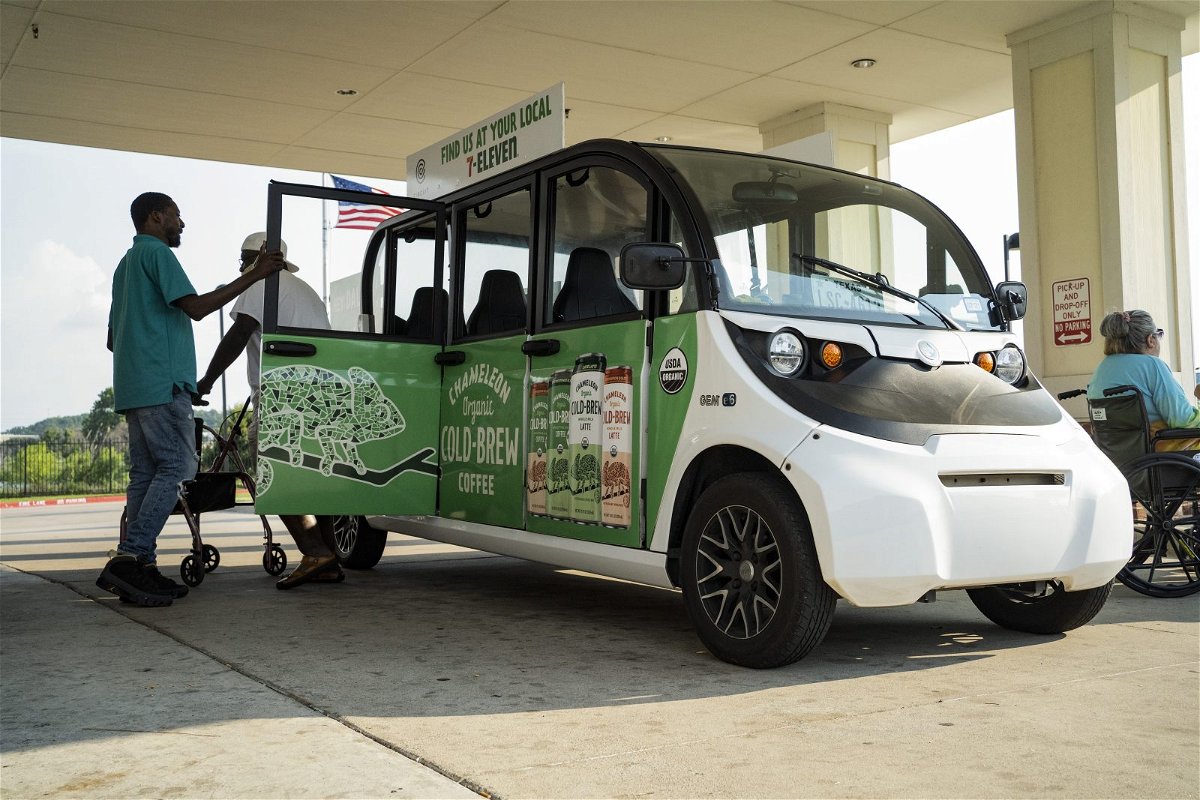
Circuit co-founder Alexander Esposito says the ride-share company chooses not to advertise their service to keep demand manageable, but it’s hard to miss the fleet of electric cars in West Dallas: They sport tall, oblong frames with three big windows atop three big doors, the entire vehicle pasted over with the spring pastel colors of another company’s marketing campaign.
Circuit is a free ride-share service that focuses on hyperlocal “last-mile” transportation, meaning they restrict their service areas to a 3-mile range, and their main goal is to connect people to other transit systems, such as trains or buses.
For the past year, the company has been serving the east half of West Dallas by filling in mass transportation service gaps between downtown’s Eddie Bernice Johnson Union Station, Trinity Groves, shopping centers, schools, bus stations, and more.
With a mission based in sustainability, Circuit doesn’t operate exactly like other ride-hailing or ride-booking companies. Unlike Uber or Lyft, which contract with drivers who use their own vehicles, Circuit owns and operates its fleet of electric vehicles and also fully employs all of its drivers. Rides can be requested from anywhere within Circuit’s coverage area through an app, which also pools together riders going the same way for efficiency. The service operates Monday through Friday, 7 a.m. to 7 p.m.
Circuit’s ultimate goal is to reduce congestion in cities by getting people leave behind their cars for short trips, encouraging visitors to park once, and making connections to existing mass transit hubs. The vehicles max out at a speed of 35 miles per hour and the average ride is around one mile.

Launching in West Dallas amid the coronavirus pandemic didn’t seem to limit the service, Esposito says. Drivers wore PPE and rows of seats were separated by screens. While Dallas Area Rapid Transit (DART), the nation’s largest light metro system, reported drastic declines in ridership last year that resulted in reduced service, Circuit saw growing utilization.
Circuit currently moves more than 1,100 riders in West Dallas per week, and ridership is growing. Over the first two months of launch, the number of rides grew about 144%. Their fleet is growing too, having recently added more cars and an ADA-accessible vehicle.
Jesse Landry is the co-founder of ride-share service Ryde, which partners with Circuit. He found the pandemic highlighted a need in communities as people’s lives changed.
“The feedback has been heartwarming,” Landry says. “Every time I come [to West Dallas], I almost always have handwritten thank you letters. Especially since coronavirus had people concerned about how they would get around the community. I’d get letters saying, ‘Thank you for getting my kids to school, lessening my stress.’ ”
Nearly all of the service’s drivers live in West Dallas, and many riders know them by name. Circuit was Jakwan Riddick’s first job as a driver, and getting used to an electric vehicle took time, but he says he loves his job.

“I live in West Dallas so when I started seeing [Circuit vehicle], just like everybody else I wondered, ‘Wow, what is this?’ I went from talking to Jesse one day to him showing me the ropes, then driving myself,” Riddick says. “I was actually showing him his way around because I lived over here and he didn’t.”
The car doesn’t have AC but it roars with air rushing through the tall windows. Riddick picks up a group of older kids from the shopping center reveling in their holiday from school, and he is infinitely patient as they run back and forth trying to corral their group onto the ride. They hop off at the playground with big, easy smiles.
Riddick says he sees plenty of kids. He takes them to school in the mornings, to their favorite hangouts in the evenings. Circuit takes them to church for free snacks and to their friends’ homes. The freedom of mobility is transformative for the community, he says.
Circuit began in 2011 as a shuttle between parking lots and the beach in East Hampton, New York. It has since grown into a nationwide company, with a presence in cities across eight states, from California to Massachusetts. Its applications are just as broad: Circuit has served congested downtown and metropolitan areas, beach cities, shopping centers with off-site lots, and even professional sports teams looking to replace their game day shuttles.
While advertising partners were the service’s original funding source, they’ve been inconsistent. Some companies will only be in an area for months at a time. One month may bring enough money to expand the fleet of cars, but the next may require the whole service to shut down while waiting for the next advertiser.

Circuit received its footing in West Dallas through a partnership with the Toyota Mobility Foundation. Toyota’s philanthropic efforts have a large presence in West Dallas; it is currently funding local scholarships and a magnet school, among other neighborhood programs. The foundation was looking for solutions to transit service gaps and environmental issues when Toyota program leads met Circuit’s founders at a conference.
“Our service and our technology is designed to increase ridership on a shared and controlled fleet that keeps the community needs at the forefront but also complements existing transportation options,” Circuit co-founder James Mirras says. “This way all the options work more productively, and ultimately the transit system is more accessible and sustainable.”
These values aligned with what Toyota was looking for, Mirras says, and they served as the primary investor for Circuit’s West Dallas pilot launch. Toyota continues to fund the service, and though Esposito says they can’t disclose the financial details of the private contract, he says Circuit runs similar programs with public agencies at a cost of $2.83-$5 per rider.
Now, Circuit is looking for its next funding source.
They believe the future may be in city partnerships, which usually create multi-year contracts that allow the company to have stable growth. This model has worked well in cities such as San Diego, where Circuit has operated a fleet of cars since 2014. The company is still looking for long-term funding in West Dallas but is enthusiastic about staying in the community.
“We’re not here to create a feel-good story and then leave,” Landry says.

The wait time is too long and their drivers have attitudes. The driver left me. What do I have to do, jump in front of the car for them to see me, so I dont get left.
You guys need to learn how to make a complete stop on the 4 way stop signs by Pinkston. It’s been several times I see the drivers not following the rules.
I need a ride to the store could you please help me
Hi, Shuntel, do you live in West Dallas or South Dallas? Here are your options in West Dallas:
Circuit: https://www.ridecircuit.com/westdallas
DART GoLink: https://www.dart.org/riding/golinkwestdallas.asp
And in South Dallas: https://www.dart.org/riding/golinksouthdallas.asp